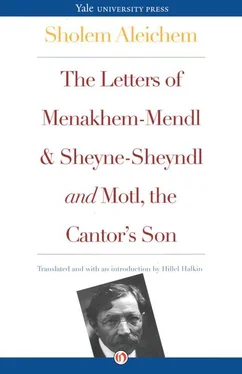Well, one of our filthy rich Kasrilevke Jews went by the name of Moyshe-Noyekh. He not only owned his own house with its own yard and its own garden, he was so important that he went around all summer in his underwear. I don’t mean only in his underwear — he wore a dressing gown over it. But you won’t find a poor Jew dressed like that. You have to be a big deal not to care what anyone thinks of you.
Anyway, we all knew that Moyshe-Noyekh had inherited three shops from his mother, all smack in the middle of the market. He had his own cow too, a real milker. Not that three shops weren’t enough to get by on. They were more than enough. But Moyshe-Noyekh’s wife Nekhameh-Mirl (we called her Dekhabeh-Birl because her nose was always stuffed) milked so much milk from that milker that she could have paid all their bills just from that. Of course, to keep the Evil Eye away, she told everyone that her “bilk cow” didn’t give a drop of “bilk.” That didn’t fool Kasrilevke, though. Everyone knew it was a lie. The bilkless bilk cow was full of milk.
Would you believe a Jew like Moyshe-Noyekh running for dear life to America in his birthday suit? It could break a heart of stone. And what was he supposed to do when he got there? You couldn’t expect him to work in a shop. Nor his children. And so the Kasrilevke Synagogue Association took one look at him and made him the beadle of the Kasrilevke shul.
A beadle in America is not small potatoes. He lives better than a businessman in Kasrilevke. He can get rich from memorial days alone. They’re very big on them here. All year long no one has time to pray. “Teim iz mahnee,” as they say. But comes the anniversary of a death and off to synagogue everyone goes. And after prayers the family goes to a restaurant for a memorial banquet. You can bet the beadle gets thrown a few bones then, to say nothing of bar mitzvahs. When a bar mitzvah comes along he’s in the gravy.
Back in Kasrilevke, becoming bar mitzvah meant putting on tefillin and praying with the grown-ups. In America it’s a national holiday. They take the young man, put a prayer shawl on him, call him up to the Torah like a bridegroom so that he can chant in a voice like a rooster’s, and listen to him spout a speech he’s learned by heart — all in English. God forbid he should say a Jewish word! When he’s done he gets blessed by the rebbei, who’s as beardless as a Catholic priest. There are presents and the beadle gets his share.
In short, Moyshe-Noyekh has a swell dzhahb. His only problem is having to make the rounds of the synagogue members every month to collect the dooz they’ve pledged. What kind of dzhahb is it for an ex-rich Jew to go collecting from house to house? Dekhabeh-Birl actually wept as she said to my mother, “I’b tellid you, every tibe by husba’d bakes the rou’ds, it’s a pudishbed.”
That gave my mother an idea. Why didn’t Moyshe-Noyekh ask my brother Elye to be his collector? It would be a load off Moyshe-Noyekh’s mind and Elye would make a living.
Needless to say, Moyshe-Noyekh welcomed the idea. It was Elye who balked at first. It didn’t appeal to him. Not until Pinye stepped in. He gave Elye a tongue-lashing as only he can. Did he let him have it!
“It’s beyond me how you can be so snooty! What makes you think you’re any better than Kahnegi, Rahknfelleh, and Vendehbilt?”
Excetra, excetra.
Leave it to Pinye!
Who would have thought that a little dzhahb collecting synagogue dooz would lead in the end to a big dzhahb? And not one big dzhahb but two — one Elye’s collecting for a foinitsheh biznis and one Pinye’s collecting for an inshurinks kahmpeni. Wait a minute and I’ll tell you what they do.
One good thing about America is that everything gets delivered to your home. And you can buy it in installments for a dahleh a week and fix up your house like a lord’s. It’s called foinishink deh epahtment.
Don’t ask me what kind of word foinitsheh is. Elye says it comes from “fein” and “tsheh.” Pinye says that’s ridiculous. In the first place, the word should be “feinitsheh.” And second, why a fine chair and not a fine mirror? Elye answers that only an idiot would say feinitsheh instead of foinitsheh. He says that’s the law of foinetiks.
They went at it so that they nearly came to blows. Luckily, Brokheh came along and put an end to it. She made them agree to ask an American — I mean a Jew who isn’t a grinhawn.
It turned out that the word is neither feinitsheh nor foinitsheh. It’s firnitsheh. Go figure.
No one in America pays cash — not unless you’re a Jew like Dzheykip Shif. They say he’s the richest man in America. That’s according to Elye. Pinye disagrees. Kahnegi, he says, is richer. And Vendehbilt puts Kahnegi in his little pocket and Rahknfelleh makes them both look like pikers. “That’s a good one!” Elye says. “You’re talking real estate and I’m talking cash. Shif ’s got more cash than all of them together.”
That was too much for Pinye. Elye, he shouted, didn’t know what he was talking about. Rahknfelleh gives away more cash in a year than all Shif ’s property is worth.
Elye hit the ceiling. “Pinye,” he cried, “you’re an anti-Semite!” Shif, Elye said, is a Jew, even if Rahknfelleh is richer. If we Jews don’t stick up for each other, who will?
“I don’t care if Shif is ten Jews!” Pinye said. “Does that mean I have to lie for him? You’re forgetting, Elye, that we’re in America. In America no one likes a blahfeh.”
“If you’re talking about lies,” Brokheh said, “I’d like to see one of my enemies drop dead for every lie told each day in New York City. And that’s not including Bruklin, Brawnzvil, and the Brahnks.”
She stopped that argument cold.
If you’re going to charge a dollar a week for firnitsheh, you need someone to go get the dahleh. That’s your kehlehkteh. There are plenty of them.
Every kehlehkteh has his own route with its own houses. He knocks on the door and says “Gud mawnink.” Then he says “Iz ah vehry neis dey,” takes your dahleh, writes out a receipt, and says “Gudbei.” That’s all there is to it. You don’t even have to take off your hat. It isn’t the custom. You can walk whistling into the richest man’s house with your boots on, or with a cigarette or tshooinkahm in your mouth, and no one will say a word. That’s America.
Elye likes his new dzhahb. It’s a lot better than selling haht dawgz in a delikatesn and he makes more money. Some weeks he brings home eight dahlehz, and some ten or twelve. It depends on the veddeh. If the veddeh is good, he vawks. If it’s bad, he has to take the stritkah. That costs a nikl. Elye doesn’t like to part with his nikelz. He’s tight with his money. He isn’t like Pinye.
Pinye is a big spender. He almost never vawks. That’s because he’s nearsighted and could be run over. Actually, he says, he’s more absent-minded than nearsighted. He’s always thinking about something. He can’t let a minute go by without reading a book or a noospeypeh. Even when he’s writing, he’ll stop to think in the middle of a sentence. He doesn’t hear what you say to him then. All of a sudden he’ll grab a pencil, or a pen and some ink, and fill both sides of ten pages. Nobody knows what he’s writing or plans to do with it, not even Taybl. When Elye asks him, he says:
“You’re too young to know.” We’ve grown older and still don’t know.
Nevertheless, Pinye makes a living. He’s a kehlehkteh too. Not for firnitsheh. Pinye kehlehkts for leif inshurinks. Actually, it’s more like death inshurinks. Everyone in America has it: husbands, wives, children, parents, brothers, sisters. It costs a nikl to a dahleh a week, no cash down. The more inshurinks you have, the more you pay. There are families in which everyone, from the little babies to the grandparents, carries death inshurinks. If there’s anyone who doesn’t, it’s up to the kehlehkteh to see that he does.
Читать дальше












